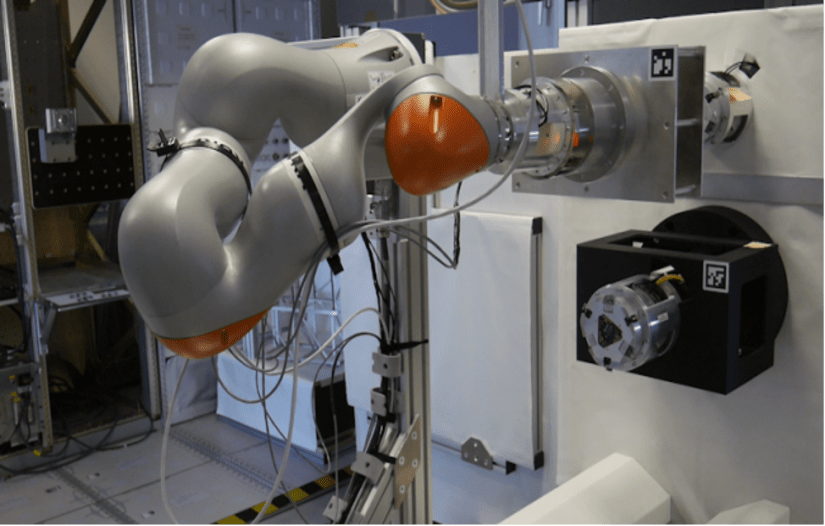European H2020 project PERIOD undergoes successful final testing

The final tests and demonstrations of PERIOD (PERASPERA In-Orbit Demonstration) were successfully completed this past December. PERIOD is one of the Horizon 2020 projects being carried out as part of the third phase of the Strategic Research Cluster (SRC) for Space Robotics Technologies, managed under the European PERASPERA project. The final testing included an ambitious and novel in-orbit demonstration (2026).
PERIOD’s main goals are to define, implement, demonstrate, and disseminate the technological maturity in Europe of the orbital concepts known as in-space manufacturing and assembly (ISMA) and satellite refueling. The hope is to bring these concepts to production and market in the not-too-distant future (~2027) in Europe’s institutional and commercial frameworks (in-orbit servicing).
The demonstration scenarios defined in PERIOD were carefully chosen to convince the scientific community and other stakeholders of the possibility of manufacturing, assembling, and refitting in-orbit satellites and/or large antennas, as well as using the International Space Station (ISS) as a possible orbital refueling station. Manufacturing includes building an antenna, assembling the satellite components, and refitting them in the same orbital factory using the autonomous Motion Planning & Execution subsystem based on ERGO and ESROCOS (GMV), two previous projects carried out by the same SRC. The demonstrator will be hosted on the ISS’s Bartolomeo platform, which will be upgraded to increase the orbital validation level of capabilities such as assembly, structure fabrication, and refueling experiments.
GMV (Spain and Portugal) is part of a consortium of seven partners led by Airbus Defense & Space GmbH. GMV’s involvement in this project has been crucial, allowing for the reuse and adaptation of the ESROCOS (GMV Portugal) and ERGO (GMV Spain) frameworks, as well as for the requirements specification, design, implementation, integration, verification, and validation of both frameworks during the project.
Over the last months of the project (November and December 2022), two actions were carried out simultaneously to verify and validate the objectives set for PERIOD:
- Increase the maturity of the software technologies used in the project: a technology readiness assessment was carried out on the software technologies used to define and implement the system, and GMV managed to increase the technology readiness level (TRL) of the frameworks under its purview (ESROCOS and ERGO) from TRL4 to TRL5 after several test sessions and campaigns (unit, integration, and system testing) carried out in the orbital testbed known as RISMAT (Airbus, Bremen/Germany).
- Carry out the final system demonstration: in early December, a simplified version of the final system was verified, validated, and demonstrated in the presence of the European Commission project officer, several representatives of the Project Support Activity from various national research centers (CDTI, DLR, ESA, etc.), and external auditors.
Both activities were satisfactorily carried out in accordance with the requirements and standards set for the project.
The PERIOD project is taking place within the framework of the European Union’s Horizon 2020 research and innovation program (grant agreement no. 101004151).
More about GMV’s role in the space robotics technologies SRC
The Strategic Research Cluster (SRC) for Space Robotics Technologies is coordinated under the PERASPERA project, which also receives funding from the European Union through its Horizon 2020 space program “COMPET-4-2014: Space Robotics Technologies” (grant agreement no. 640026).
The objectives of this SRC are to design, develop, and test the space robotics technologies needed for future in-orbit servicing, exploration, and space exploitation missions, which will extend the useful operational life of satellites by improving their efficiency during space missions.
GMV has played an important role throughout the entire evolution of the work performed for this SRC. During the first phase, GMV coordinated three of the six projects: ESROCOS (OG 1), ERGO (OG 2) y FACILITATORS (OG 6). Under the second call, GMV was active in all projects, with responsibility for coordinating ADE (OG 10) while also participating in the EROSS (OG 7), MOSAR (OG 9), and PRO-ACT (OG 11) projects. With the third call, GMV took part in EROSS+ (OG 12), PERIOD (OG 13), and COROB-X (OG 14). Finally, for the most recent call GMV is participating in EROSS IOD (European Robotic Orbital Support Services In Orbit Demonstrator), the only project from this phase. In 2026, the first European demonstrator mission for robotic on‑orbit satellite servicing and payload replacement operations will become a reality.
GMV also has extensive experience with activities from ESA’s Technology Research Programme (TRP), and it is a European leader in robotics technologies in the field of onboard autonomy and GNC systems for orbital and planetary surface applications.